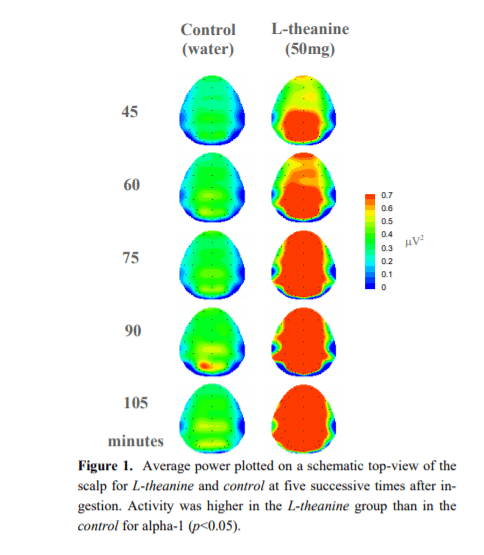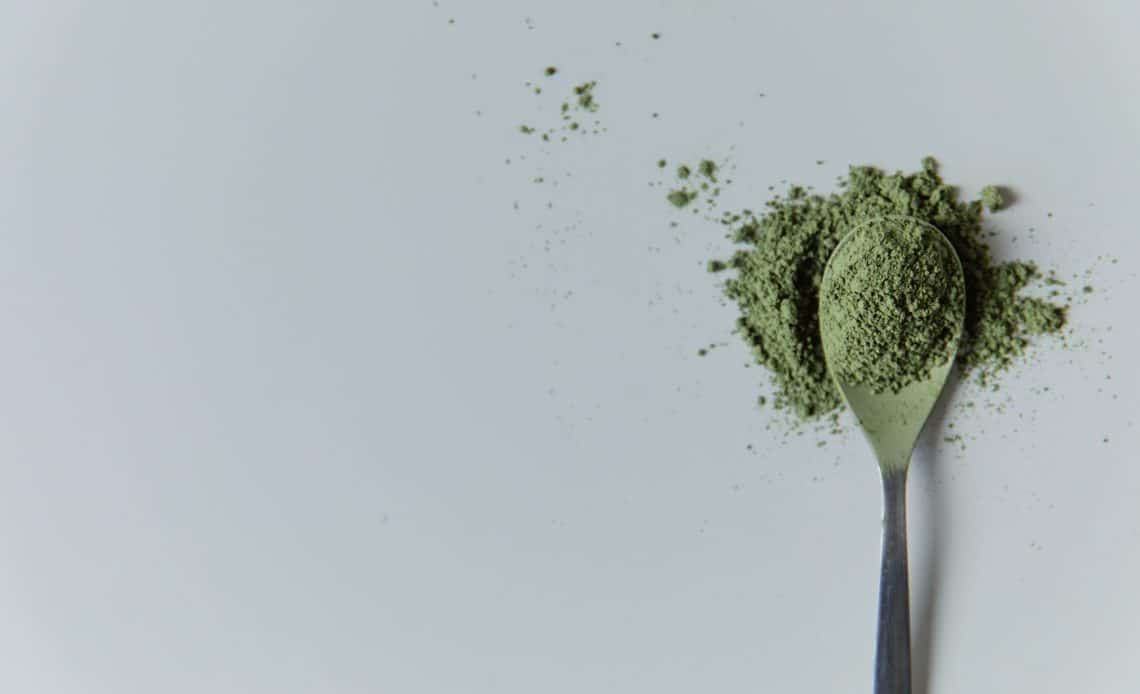
L-theanine is a water-soluble amino acid that’s commonly found in green and black tea as well as in some mushroom species. Many people take L-theanine supplements to boost mental performance, reduce anxiety and stress, promote relaxation, and improve sleep. It has become a popular supplement option, and even some elite athletes like Tiger Woods swear by its benefits.
In this article, we’ll discuss the current research that’s available on L-theanine and review its main health benefits and potential side effects. We’ll also explain more about what dosage to use as well as when and how to take L-theanine. Finally, we’ll share a few tips on how to find the best L-theanine supplements and provide you with our top picks for the best brands available today.
So, if you are interested in trying this popular supplement, read on to learn more about it.
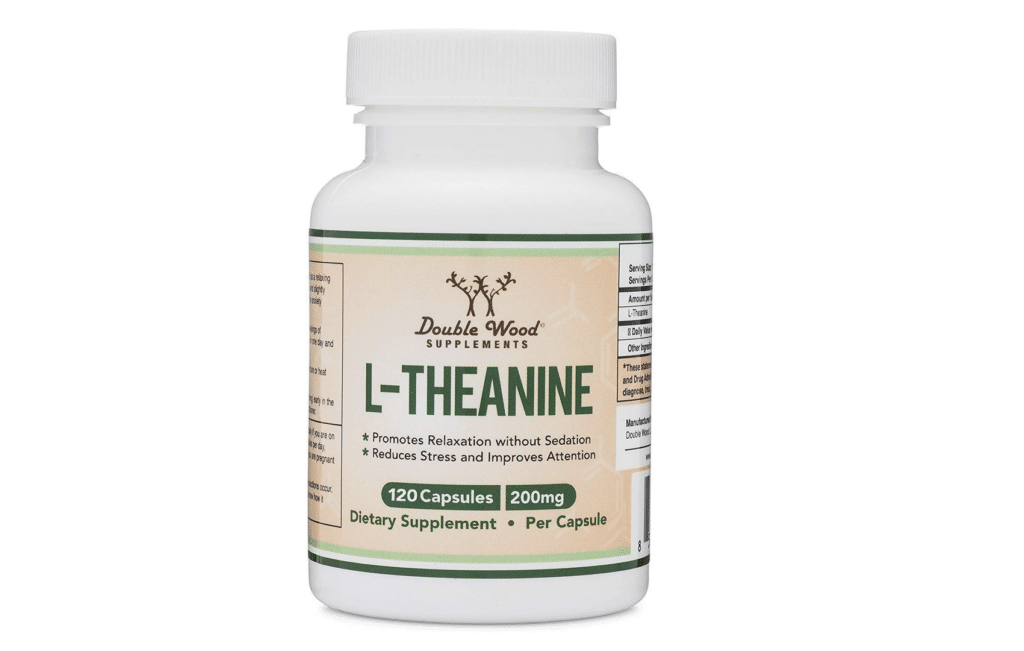
Looking for the best L-theanine supplement?
Products by Double Wood Supplements are made in the USA, 3rd-party lab-tested, and manufactured in a GMP facility. Each bottle contains with 120 capsules, each providing 200 mg of L-theanine.
L-Theanine Studies
Tea is the second most widely consumed beverage in the world after water. Regular tea consumption has many health benefits, which is why scientists have tried to identify molecules associated with those benefits.
L-theanine is one of them, and it was first discovered in 1949 when researchers isolated it from the leaves of Camellia sinensis or tea plant.
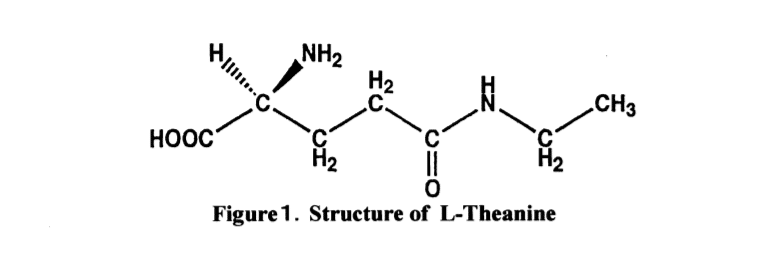
Since then, people have taken L-theanine supplements for:
- Depression
- Insomnia
- Anxiety
- Stress reduction
- Improving focus
- Blood pressure regulation
L-theanine is generally recognized as safe by the FDA, and it received its GRAS status in 2006. However, most of the evidence for supposed benefits is anecdotal as we lack clinical studies that will confirm the efficacy of this supplement.
Here is what we know so far…
L-Theanine For Anxiety And Stress Reduction
A hot cup of tea can help you relax after a long day, and it seems that L-theanine is one of the molecules we can thank for that. A study examining the L-theanine’s effect on brain activity found that the consumption of this supplement increased the activity of alpha brainwaves. These brainwaves are linked with a state of relaxation and mental alertness without drowsiness. So, L-theanine can help you feel more relaxed while retaining focus.
Another study determined that L-theanine could lower heart rate and other biomarkers related to acute stress. However, the study had a small sample size and only included male participants.
Most studies conducted on L-theanine and its effects on anxiety have been performed in animal models, and human trials are quite rare. However, a 2016 systematic review identified five human studies, all placebo-controlled. The researchers wanted to investigate how supplementation with 200-400 mg of L-theanine per day affected people in stressful situations. The results showed that taking L-theanine supplements can help reduce stress and anxiety.
However, all studies had small sample sizes. That’s why we need more comprehensive trials to estimate the potential of L-theanine for stress and anxiety relief.
A 2011 study focused on the effects of L-theanine on people with schizophrenia and schizoaffective disorder. Researchers discovered that L-theanine was safe and welL-tolerated. In addition, it reduced anxiety and improved other symptoms.
However, another study using higher doses of L-theanine (450-900 mg) found no improvements in anxiety symptoms.
L-Theanine For Depression
The research investigating the potential of L-theanine in managing depression symptoms is still in its early stages. One open-label clinical study set out to discover whether supplementation with 250 mg of L-theanine per day had any benefits on people with mild forms of major depressive disorder.
The results after eight weeks showed that L-theanine supplementation is safe and effective for improving depression symptoms such as anxiety, sleep disturbances, and cognitive impairment. However, the study included a small sample (20 people total) and didn’t have a placebo control group. Those are some serious limitations that future studies need to overcome in order to get some solid evidence of L-theanine’s potential for managing depression symptoms.
L-Theanine For Sleep
Anxiety and stress are common factors affecting the quality of your sleep. That’s why scientists wanted to investigate if L-theanine and its stress reduction properties could lead to better sleep.
A small 2019 study discovered that supplementation with 200 mg per day of L-theanine produced significant benefits. People taking these supplements needed less time to fall asleep, experienced fewer sleep disturbances, and used other sleep medications less frequently compared to the control group that received placebo.
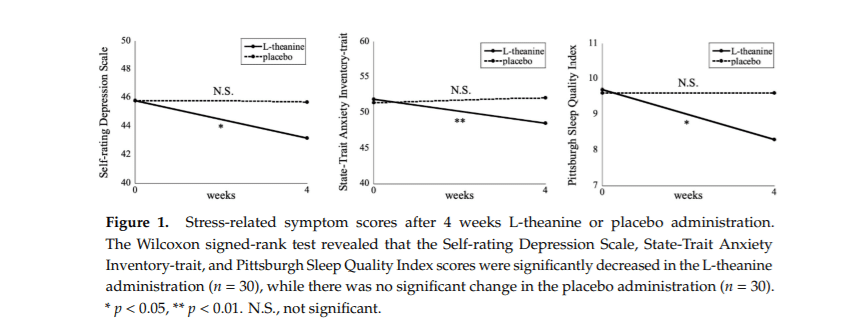
Another study discovered that L-theanine could help improve sleep quality in patients with schizophrenia. It appears that it could also do the same in boys with attention deficit hyperactive disorder (ADHD).
A study investigating this link found that 400 mg of L-theanine per day improved sleep disturbances and poor sleep efficiency. These findings are significant since sleep issues are common in people with ADHD. However, it is important to mention that Taiyo, a company producing Suntheanine (L-theanine), funded this study.
The same study that found no effects between supplementing with higher doses of L-theanine and anxiety relief also concluded that it had no impact on insomnia severity. However, L-theanine did help people report higher levels of sleep satisfaction. Thus, we need more studies to confirm the relationship between sleep quality and L-theanine.
L-Theanine For Restless Legs Syndrome
Many people with restless legs syndrome (RLS) report improvement after taking L-theanine supplements. However, these reports are anecdotal as we have no scientific evidence to support these claims.
One of the possible mechanisms for this benefit is L-theanine’s ability to manage the release of certain neurotransmitters, such as dopamine. Dopamine plays a vital role in regulating and controlling muscle movement. It appears that people with RLS experience imbalanced dopamine levels, which may be one of the causes of this condition. L-theanine could turn out to be beneficial, but we need some clinical evidence to confirm this.
L-Theanine For Cognitive Performance
If you are looking to improve your focus and cognitive performance, it seems that combining L-theanine with other compounds may be an excellent idea. For instance, the combination of L-theanine and caffeine supplements can improve subjective alertness, tiredness, and accuracy during complex tasks. However, this study observed no benefits on other types of cognitive tasks.
A similar study reported that the combination of L-theanine and caffeine could enhance attention switching performance and the ability to ignore distractions. These effects are vital for preventing overstimulation and staying focused while performing complex tasks.
A meta-analysis reviewed the studies examining the benefits of L-theanine and epigallocatechin gallate (EGCG) in combination with caffeine on mood and cognitive function. Researchers observed the patients only for a few hours after taking the supplements, and they experienced better mood, alertness, and attentional switching accuracy during this time.
Combining L-theanine and green tea extract could also improve attention and memory in subjects with mild cognitive impairment. Although this study had a small sample size, it shows that compounds found in green tea, particularly L-theanine, could have favorable outcomes on cognitive performance.
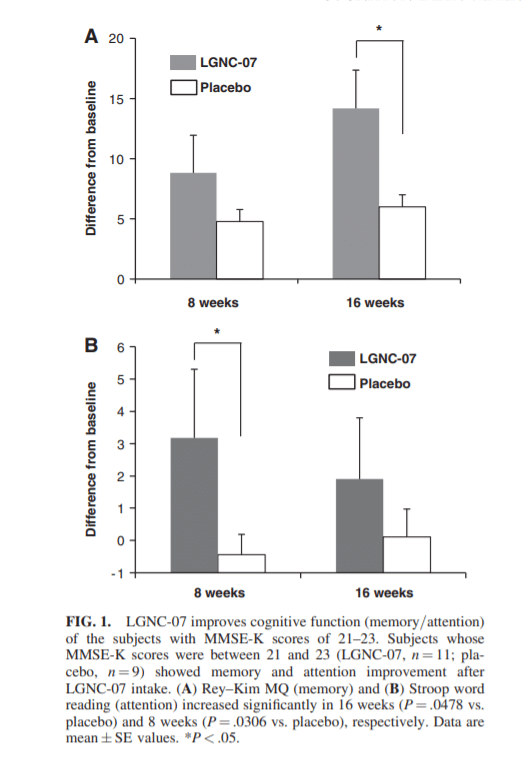
L-Theanine For Immunity
There is some evidence that L-theanine and tea consumption, in general, could improve immunity. However, those immunity-boosting effects seem to result from other compounds besides L-theanine. Catechins are a group of powerful antioxidants found in green tea, and they have many health-inducing benefits like reducing inflammation and supporting a prompt immune system response.
Studies show that regular green tea consumption reduces the chances of flu in schoolchildren and healthcare workers. So, if you’re wondering if you can use L-theanine for kids, the answer is yes. However, you should consult a healthcare professional and start with lower doses.
Other studies found that supplementation with L-theanine could help athletes boost their immune system response. It seemed like the supplementation helped modulate particular inflammation biomarkers, which could improve recovery.
L-Theanine Side Effects
The FDA generally considers L-theanine safe in doses up to 250 mg per day. However, more studies are needed to confirm its health benefits and possible side effects.
Generally, no significant side effects are reported with regular L-theanine use. Some of the studies we mentioned administered these supplements for 8-10 weeks with no observable side effects.
Some anecdotal side effects include:
- Headaches
- Nausea
- Irritability
- Brain fog
Headaches
Although side effects of L-theanine are rare, experiencing a headache is the most commonly reported issue. One study examining the effects of L-theanine with and without the addition of caffeine found that people taking these supplements alone had a higher chance of experiencing headaches. Combining it with caffeine alleviates this effect and improves alertness, energy levels, and focus.
Nausea
Side effects like nausea, diarrhea, and digestive issues are possible when using higher levels of L-theanine. No studies recorded the direct impact of this supplement on digestive system health, only user reports. However, research shows that consuming excessive green tea or green tea extract could lead to gastrointestinal problems.
Irritability
Consuming too much green tea can lead to irritability. However, that’s probably caused by too much caffeine and not L-theanine.
People rarely report feeling more irritable when taking L-theanine supplements. If that’s the case, you should talk to your healthcare provider as you may be experiencing this side effect due to interaction with your medication.
Brain Fog
Although L-theanine should help you relax and “clear your mind,” very few people report experiencing brain fog after taking this supplement. There are no studies that have observed this phenomenon, and it appears to be a sporadic side effect with high doses of L-theanine.
Who Shouldn’t Take L-Theanine?
Although it is generally considered safe, some people shouldn’t take this supplement due to their health status or possible L-theanine interactions with their medication. That includes:
- Pregnant and breastfeeding women.
There isn’t enough evidence to confirm that L-theanine is safe during pregnancy. That’s why it is better to stay on the safe side and avoid using it while pregnant or breastfeeding.
- People with low blood pressure.
Some evidence suggests that L-theanine may lower blood pressure, especially during stressful situations. That means that people with low blood pressure may experience adverse effects like dizziness, which is why they should talk to their doctor before they start taking L-theanine. You should also avoid L-theanine if you take drugs or other supplements to lower blood pressure. The combined effects may result in a blood pressure that’s too low.
- People taking stimulants for mental health disorders.
Stimulants are commonly used to treat many mental health issues like ADHD. If your regular therapy includes stimulants, you should talk to your healthcare provider before taking L-theanine. This supplement can affect the levels of certain neurotransmitters, which can interfere with your treatment plan.
How To Take L-Theanine
L-theanine is mainly sold in capsule form. The L-theanine dosage will depend on the results you want to achieve. Preparing for a stressful event, managing anxiety symptoms, boosting cognitive performance, and improving sleep are the most common reasons to start using this supplement.
Keep in mind that it takes around 30 minutes for L-theanine to cross the blood-brain barrier, and its maximal levels are observed five hours after intake.
L-Theanine Dosage
Since there isn’t conclusive research on safe L-theanine dosage, the best way is to consult with a medical professional for guidance. People most commonly use 200-250 mg per day, but anywhere between 50-400 mg per day appears to be safe.
People interested in nootropics and brain hacking think that our sensitivity to L-theanine is different, which is why we should all start slow and figure out what works in the range of 50-400 mg per day. Some people use 800-900 mg, but we don’t recommend doing this as it can lead to symptoms that may mimic depression.
If you have a big presentation at work and want to feel more relaxed, taking 200 mg may induce temporary stress relief. People going through a more stressful period and needing something to take the edge off may try with lower doses of 50-200 mg daily. These doses can induce those alpha brainwaves and the state of alerted relaxation we talked about.
Higher dosages are reserved for sleep and anxiety and you can take anywhere between 250-400 mg per day. On the other hand, taking 100 mg per day could be the sweet spot for cognitive improvement.
When To Take L-Theanine
If you want to improve your mental focus and performance, it is a good idea to take L-theanine with your morning coffee. The combination of L-theanine and caffeine seems to produce the best effects on cognitive performance.
On the other hand, if you’re looking to improve your sleep, taking L-theanine before bedtime seems to be the best option.
What To Look For When Buying L-Theanine
The good news is that the market is full of excellent L-theanine supplements, so you don’t have to worry about getting a bad product. The main thing to look for is the dosage for the benefit you want. Doses can vary significantly, so checking that should be your priority.
Besides dosages, you should pay attention to other stuff on the label as L-theanine supplements often contain caffeine and other ingredients. You don’t want a product filled with caffeine when trying to get better sleep.
A few other things can reveal an excellent L-theanine supplement, like:
- Brand’s reputation.
It’s always a good idea to check the brand’s reputation and whether they had any incidents with the quality of their products. If they have a history of creating quality products with honest practices, it is more likely that their L-theanine will be good.
- Third-party testing.
Good brands allow independent labs to test their products for ingredient purity and overall quality. After the tests are performed, the company receives a certificate of analysis they can display on their website on some other platform. Look for this certificate as it is a good indicator of honest practices and adequate quality.
- Manufacturing practices.
When the FDA inspects a facility and concludes that it adheres to their rules and regulations, they award it GMP certification. That’s why you should look for a manufacturer with GMP-certified facilities.
- Marketing material.
Nutritional supplements aren’t magical cures, and brands should be very clear about that. Good brands use honest descriptions, state benefits in sync with current research, and don’t overhype their products.
- Online reviews.
Although fake reviews are a common problem in the supplement world, you should always check online reviews before buying a product. Look for those extensive rating explanations with personal stories as they are surely written by real customers. Reading those reviews can help you learn more about possible l-theanine benefits and side effects.
How To Find The Right L-Theanine On Amazon
Amazon is a perfect place to find quality supplements. However, you must first eliminate the bad ones.
The best way to do that is to read the reviews. You can install a plugin such as Fakespot to determine how many fake reviews each product has. Read those reviews and see what other people say about the benefits they experienced.
Besides reviews, other credibility markers can help you pick the right L-theanine, such as:
- Multiple photos of the product and the nutritional label
- An honest product description
- GMP certification
- Certificate of analysis from a third-party lab
- Well-written sellers page
- Brand’s reputation and presence outside Amazon
What Are The Most Trustworthy L-Theanine Brands?
If you don’t have time to research different brands on Amazon, don’t worry. We did our homework so that you don’t have to.
Here are our top five L-theanine brands.
Thorne
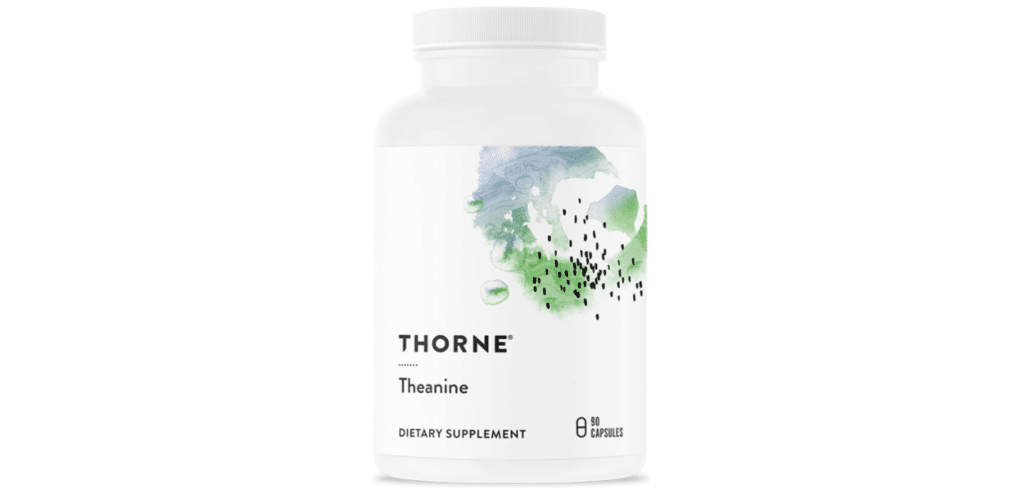
Thorne has a reputation as one of the best supplement brands and it’s commonly recommended by health professionals. Its L-theanine is manufactured in a GMP-compliant facility and the company regularly inspects its supplements to ensure the best quality possible.
Thorne has an “A” rating by Australia’s Therapeutic Goods Agency, a regulatory institution with some of the highest standards. In addition, it is recommended by many professional sports leagues such as the NBA, NFL, UFC, and MLB.
Life Extension
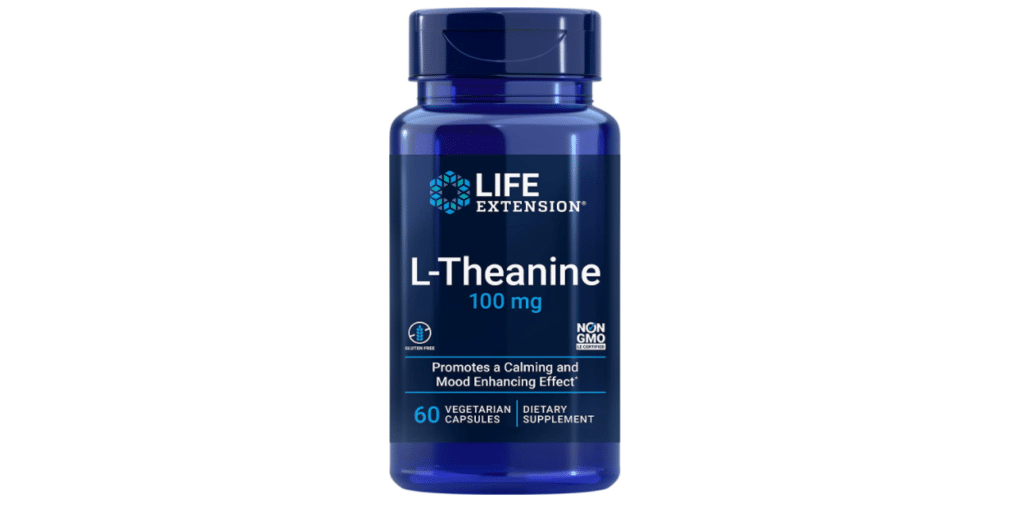
Life Extension is all about research and innovation and has been in the supplement game for over 40 years. All of its products’ formulations are based on the latest nutritional science and are manufactured in the US. However, Life Extension but does source raw ingredients worldwide like most other companies.
Most importantly, Life Extension is transparent about its practices, follows strict procedures, and enrolls in independent lab testings.
Doctor’s Best
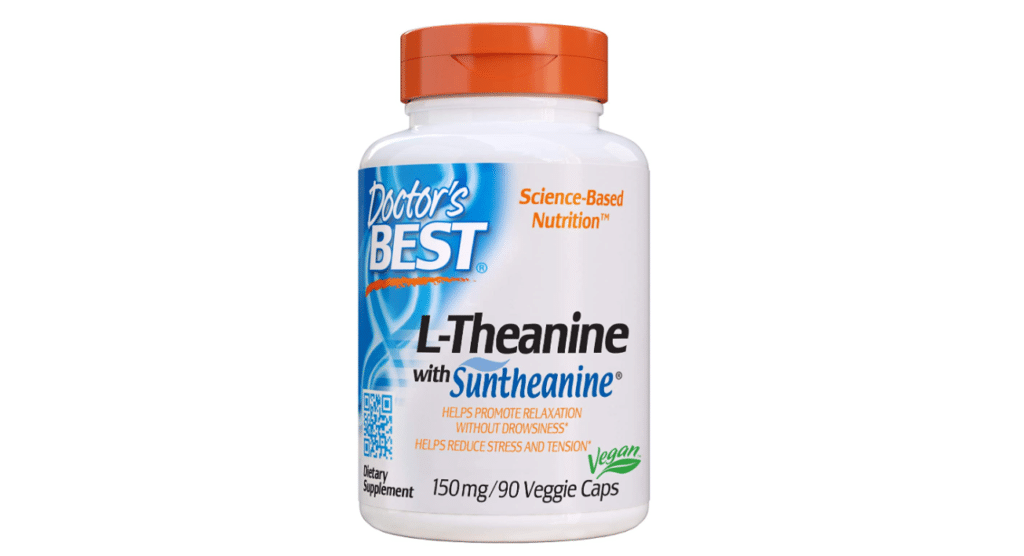
Doctor’s Best has over 30 years of experience in the nutritional supplement industry. The company sources raw materials internationally, but all of its products are manufactured and quality tested in GMP facilities in the United States.
We picked this brand because Doctor’s best offers high-quality products and honest practices. However, we must mention that it stopped sending its certificate of analysis upon request, which is not ideal.
KAL
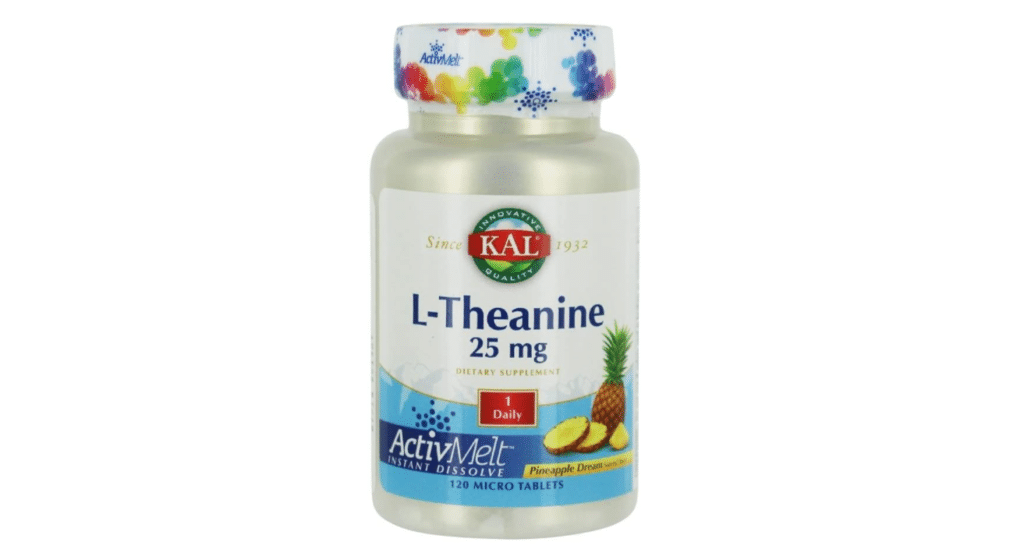
Kal was founded in 1932, so it has a long history of creating top-quality supplements. The company sources its ingredients internationally and manufactures its products in Utah.
KAL performs regular testing to ensure the best quality of raw ingredients and end products. In addition, it submits its supplements for third-lab analysis. So, KAL is completely transparent about its practices, it uses honest descriptions, and it has an excellent reputation and long history.
Sports Research
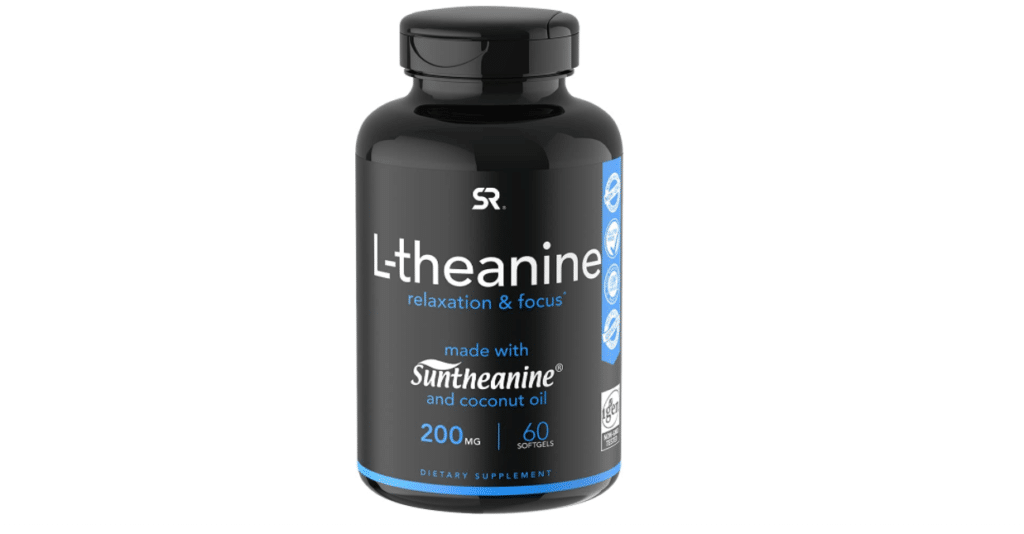
Sports Research was founded in 1980 to enhance the workouts of professional athletes and workout enthusiasts. The company has an A+ rating by the Better Business Bureau (BBB) and its formulations are backed by science.
Its products are made in the US and undergo strict quality and safety practices. Sports Research uses honest marketing practices and doesn’t make any extraordinary claims.
L-Theanine FAQs
What is L-theanine?
L-theanine is a non-protein amino acid found in the leaves of the tea plant Camellia sinensis. Although this compound is not essential for our bodies, it appears to have several benefits including mood regulation, stress relief, anxiety reduction, cognitive enhancement, and improved sleep.
How does L-theanine work?
L-theanine crosses the blood-brain barrier and affects certain central nervous system neurotransmitters. That includes dopamine, gamma-aminobutyric acid (GABA), and serotonin. L-theanine also inhibits certain receptors in the brain, leading to regulation of stress, reduced anxiety, and better cognitive performance.
What Is Suntheanine?
Suntheanine is a brand name for L-theanine created by Taiyo. This Japanese company produces Suntheanine and most L-theanine brands use it in their products. In addition, many studies examining the effects of L-theanine use Suntheanine.
What kind of amino acid is L-theanine?
L-theanine is a non-protein, water-soluble amino acid. It is naturally found in the leaves of green tea, and it’s not essential for our survival. However, it brings certain health benefits that can significantly improve the quality of your life.
What does L-theanine do in the body?
L-theanine travels through our circulatory system to the brain. There, it activates specific processes that regulate neurotransmitters such as dopamine, serotonin, and GABA. These neurotransmitters are vital for anxiety regulation, mood, and other aspects of our mental health.
How long does it take for L-theanine to start working?
Most studies found that L-theanine needs around 30 minutes to reach your central nervous system, and that’s when you can expect the first effects. However, the peak occurs five hours after consumption.
How much L-theanine can you take a day?
There isn’t a universally recommended dose, but most people agree that 200 mg per day is sufficient. However, you can take anywhere between 50-400 mg per day without worrying about side effects. Some people go as much as 800-900 mg per day, but we wouldn’t recommend it. FDA warns that your L-theanine consumption shouldn’t exceed 1200 mg per day.
How much L-theanine should I take for anxiety?
The recommended dosage of l-theanine for anxiety is 400 mg per day. The best way to do that is to take one 200 mg capsule in the morning, and one in the evening, before bedtime. That way, you’ll have steady l-theanine levels throughout the day.
How often should you take L-theanine?
The frequency depends on your desired effects. You can take it once to mitigate the impact of a stressful event. You can use it every night to enhance your sleep, or maybe two times a day for anxiety management. Determine your goal, and then figure out how often you should take it.
How much L-theanine is in a cup of green tea?
It appears that a regular cup of commercially available green tea contains around 8 mg of L-theanine. However, factors like the type of leaves, a tea brand, and brewing time also affect how much L-theanine you’ll get in a cup of green tea.
What is the best brand of L-theanine?
In the previous section, you can find our favorite brands of L-theanine. They are Thorne, KAL, Life Extension, Sports Research, and Doctor’s Best. You can also read our review of the best L-theanine supplements on the market.
Looking To Buy L-Theanine? Read Our Review Of The Best L-Theanine Supplements
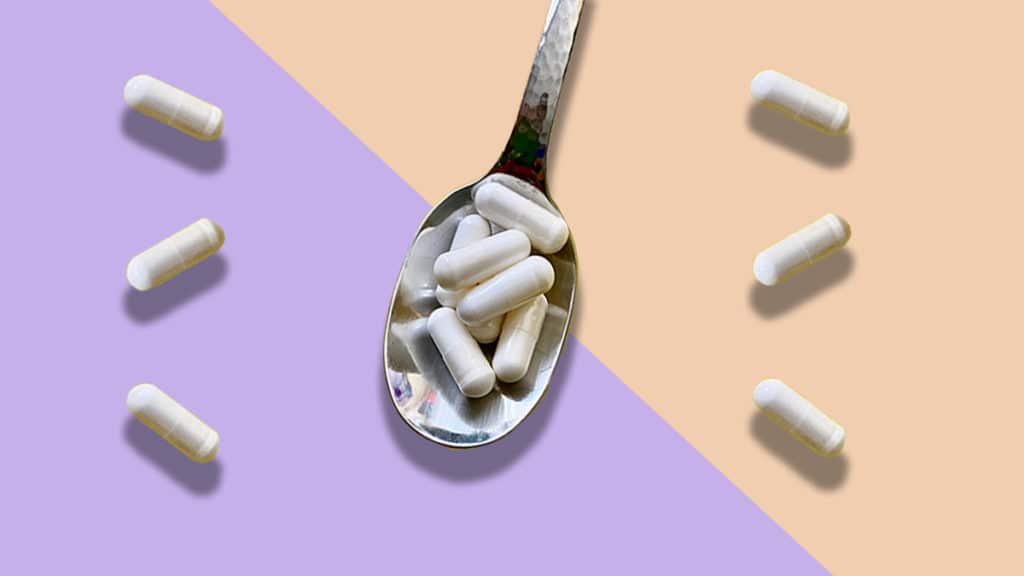
Studies You Can Read About L-Theanine
- Theanine and Caffeine Content of Infusions Prepared from Commercial Tea Samples (Pharmacognosy magazine, 2016)
- L-theanine, a natural constituent in tea, and its effect on mental state (Asia Pacific journal of clinical nutrition, 2008)
- L-Theanine reduces psychological and physiological stress responses (Biological psychology, 2007)
- Theanine consumption, stress and anxiety in human clinical trials: A systematic review (Annual Scientific Meeting of the Nutrition-Society-of-Australia, 2016)
- L-Theanine Relieves Positive, Activation, and Anxiety Symptoms in Patients With Schizophrenia and Schizoaffective Disorder: An 8-Week, Randomized, Double-Blind, Placebo-Controlled, 2-Center Study (The Journal of Clinical Psychiatry, 2011)
- L-theanine in the adjunctive treatment of generalized anxiety disorder: A double-blind, randomised, placebo-controlled trial (Journal of psychiatric research, 2019)
- Effects of chronic L-theanine administration in patients with major depressive disorder: an open-label study (Acta neuropsychiatrica, 2017)
- Effects of L-Theanine Administration on Stress-Related Symptoms and Cognitive Functions in Healthy Adults: A Randomized Controlled Trial (Nutrients, 2019)
- Effect of L-theanine on glutamatergic function in patients with schizophrenia (Acta neuropsychiatrica, 2015)
- The effects of L-theanine (Suntheanine®) on objective sleep quality in boys with attention deficit hyperactivity disorder (ADHD): a randomized, double-blind, placebo-controlled clinical trial (Alternative medicine review, 2011)
- L-theanine in the adjunctive treatment of generalized anxiety disorder: A double-blind, randomised, placebo-controlled trial (Journal of psychiatric research, 2019)
- Effect of theanine, r-glutamylethylamide, on brain monoamines and striatal dopamine release in conscious rats (Neurochemical research, 1998)
- The combination of L-theanine and caffeine improves cognitive performance and increases subjective alertness (Nutritional neuroscience, 2010)
- Psychological effects of dietary components of tea: caffeine and L-theanine (Nutrition reviews, 2008)
- A combination of green tea extract and l-theanine improves memory and attention in subjects with mild cognitive impairment: a double-blind placebo-controlled study (Journal of medicinal food, 2011)
- l-Theanine as a Functional Food Additive: Its Role in Disease Prevention and Health Promotion (Beverages, 2016)
- Green Tea Consumption Is Inversely Associated with the Incidence of Influenza Infection among Schoolchildren in a Tea Plantation Area of Japan (The Journal of nutrition, 2011)
- Effects of Green Tea Catechins and Theanine on Preventing Influenza Infection among Healthcare Workers: A Randomized Controlled Trial (BMC complementary and alternative medicine, 2011)
- The effect of L-theanine supplementation on the immune system of athletes exposed to strenuous physical exercise (Journal of the International Society of Sports Nutrition, 2019)
- The effects of L-theanine, caffeine and their combination on cognition and mood (Biological psychology, 2008)
- Green tea (Camellia sinensis) for the prevention of cancer (Cochrane Database of Systematic Reviews, 2020)
- Time for tea: mood, blood pressure and cognitive performance effects of caffeine and theanine administered alone and together (Psychopharmacology, 2008)
- Psychological effects of dietary components of tea: caffeine and L-theanine (Nutrition reviews, 2008)
Editor’s note: we are regularly updating this review. If you see any problems, weird interpretations of the data, or just want to say hi, please reach out to hello@the-unwinder.com.
Photo by Darina Belonogova from Pexels
